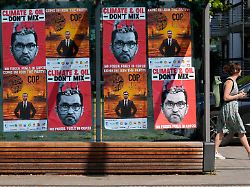Open letter to host Dubai
Doctors want to exclude fossil lobbyists from climate negotiations
November 1, 2023, 1:56 a.m
At the last UN climate conference in Egypt, lobbyists from the fossil fuel industry joined hands, with over 600 of them drumming up support for the interests of their employers. The World Medical Association and other health organizations are calling on the organizers of the next conference to ensure that this does not happen again.
Health experts from all over the world are calling for one thing open letter, to exclude lobbyists for coal, oil and gas from the upcoming UN climate conference. “The interests of the fossil fuel industry must not play a role in climate negotiations,” says the letter to the designated president of this year’s conference in Dubai, Sultan Ahmed al-Jaber. The industry is not allowed to continue its “decade-long blockade campaign against climate protection measures” at the UN negotiations – just as the tobacco industry is not allowed to have a say in the regulation of tobacco products.
Last year, over 600 lobbyists for coal, oil and gas were represented at the climate conference in Egypt. That was more than all delegations from the ten countries most affected by climate change combined. Many activists were also prevented from taking part due to high costs and problems with issuing visas. Because of the imbalance, there was criticism of the host Egypt.
The next climate conference will take place in Dubai from November 30th. The signatory organizations such as the World Medical Association say they collectively represent around 46 million health experts and doctors. They call on heads of government around the world to commit to a quick and fair exit from fossil fuels.
“Limiting the global temperature rise to 1.5 degrees is necessary to ensure health and economic prosperity for everyone. This is only possible if we quickly phase out fossil fuels,” the letter says. According to climate researchers, the goal of limiting global warming to 1.5 degrees compared to pre-industrial times is hanging by a thread. It is still considered theoretically possible, but only through a radical change in climate policy. The international community has agreed on the 1.5 degree target to avert the most catastrophic consequences of climate change.
